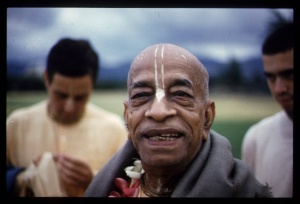SB 5.11.9: Difference between revisions
m (1 revision(s)) |
m (Text replacement - "==== <div class=" to "==== <div class=") |
||
| Line 1: | Line 1: | ||
{{info | {{info | ||
|speaker= | |speaker=Jaḍa Bharata | ||
|listener=King | |listener=King Rahūgaṇa | ||
}} | }} | ||
[[Category:Srimad-Bhagavatam - Canto 05 Chapter 11|s09 ]] | |||
[[Category:Bhagavatam Verses Spoken by Jada Bharata - Vanisource|051109]] | |||
<div style="float:left">'''[[Srimad-Bhagavatam]] - [[SB 5|Fifth Canto]] - [[SB 5.11: Jada Bharata Instructs King Rahugana|Chapter 11: Jaḍa Bharata Instructs King Rahūgaṇa]]'''</div> | |||
<div style="float:right">[[File:Go-previous.png|link=SB 5.11.8]] '''[[SB 5.11.8]] - [[SB 5.11.10]]''' [[File:Go-next.png|link=SB 5.11.10]]</div> | |||
{{RandomImage}} | |||
==== TEXT 9 ==== | ==== TEXT 9 ==== | ||
<div class="verse"> | |||
<div | :ekādaśāsan manaso hi vṛttaya | ||
ekādaśāsan manaso hi vṛttaya | :ākūtayaḥ pañca dhiyo 'bhimānaḥ | ||
ākūtayaḥ pañca dhiyo 'bhimānaḥ | :mātrāṇi karmāṇi puraṁ ca tāsāṁ | ||
mātrāṇi karmāṇi puraṁ ca tāsāṁ | :vadanti haikādaśa vīra bhūmīḥ | ||
vadanti haikādaśa vīra bhūmīḥ | |||
</div> | </div> | ||
| Line 17: | Line 22: | ||
==== SYNONYMS ==== | ==== SYNONYMS ==== | ||
<div class="synonyms"> | |||
<div | ''ekādaśa''—eleven; ''āsan''—there are; ''manasaḥ''—of the mind; ''hi''—certainly; ''vṛttayaḥ''—activities; ''ākūtayaḥ''—senses of action; ''pañca''—five; ''dhiyaḥ''—senses for gathering knowledge; ''abhimānaḥ''—the false ego; ''mātrāṇi''—different sense objects; ''karmāṇi''—different material activities; ''puram ca''—and the body, society, nation, family or place of nativity; ''tāsām''—of those functions; ''vadanti''—they say; ''ha''—oh; ''ekādaśa''—eleven; ''vīra''—O hero; ''bhūmīḥ''—fields of activity. | ||
</div> | </div> | ||
| Line 25: | Line 29: | ||
==== TRANSLATION ==== | ==== TRANSLATION ==== | ||
<div class="translation"> | |||
<div | |||
There are five working senses and five knowledge-acquiring senses. There is also the false ego. In this way, there are eleven items for the mind's functions. O hero, the objects of the senses [such as sound and touch], the organic activities [such as evacuation] and the different types of bodies, society, friendship and personality are considered by learned scholars the fields of activity for the functions of the mind. | There are five working senses and five knowledge-acquiring senses. There is also the false ego. In this way, there are eleven items for the mind's functions. O hero, the objects of the senses [such as sound and touch], the organic activities [such as evacuation] and the different types of bodies, society, friendship and personality are considered by learned scholars the fields of activity for the functions of the mind. | ||
</div> | </div> | ||
| Line 33: | Line 36: | ||
==== PURPORT ==== | ==== PURPORT ==== | ||
<div class="purport"> | |||
<div | |||
The mind is the controller of the five knowledge-acquiring senses and the five working senses. Each sense has its particular field of activity. In all cases, the mind is the controller or owner. By the false ego one thinks oneself the body and thinks in terms of "my body, my house, my family, my society, my nation" and so on. These false identifications are due to the expansions of the false ego. Thus one thinks that he is this or that. Thus the living entity becomes entangled in material existence. | The mind is the controller of the five knowledge-acquiring senses and the five working senses. Each sense has its particular field of activity. In all cases, the mind is the controller or owner. By the false ego one thinks oneself the body and thinks in terms of "my body, my house, my family, my society, my nation" and so on. These false identifications are due to the expansions of the false ego. Thus one thinks that he is this or that. Thus the living entity becomes entangled in material existence. | ||
</div> | </div> | ||
__NOTOC__ | |||
<div style="float:right; clear:both;">[[File:Go-previous.png|link=SB 5.11.8]] '''[[SB 5.11.8]] - [[SB 5.11.10]]''' [[File:Go-next.png|link=SB 5.11.10]]</div> | |||
__NOTOC__ | |||
__NOEDITSECTION__ | |||
Revision as of 15:36, 14 November 2018

A.C. Bhaktivedanta Swami Prabhupada
TEXT 9
- ekādaśāsan manaso hi vṛttaya
- ākūtayaḥ pañca dhiyo 'bhimānaḥ
- mātrāṇi karmāṇi puraṁ ca tāsāṁ
- vadanti haikādaśa vīra bhūmīḥ
SYNONYMS
ekādaśa—eleven; āsan—there are; manasaḥ—of the mind; hi—certainly; vṛttayaḥ—activities; ākūtayaḥ—senses of action; pañca—five; dhiyaḥ—senses for gathering knowledge; abhimānaḥ—the false ego; mātrāṇi—different sense objects; karmāṇi—different material activities; puram ca—and the body, society, nation, family or place of nativity; tāsām—of those functions; vadanti—they say; ha—oh; ekādaśa—eleven; vīra—O hero; bhūmīḥ—fields of activity.
TRANSLATION
There are five working senses and five knowledge-acquiring senses. There is also the false ego. In this way, there are eleven items for the mind's functions. O hero, the objects of the senses [such as sound and touch], the organic activities [such as evacuation] and the different types of bodies, society, friendship and personality are considered by learned scholars the fields of activity for the functions of the mind.
PURPORT
The mind is the controller of the five knowledge-acquiring senses and the five working senses. Each sense has its particular field of activity. In all cases, the mind is the controller or owner. By the false ego one thinks oneself the body and thinks in terms of "my body, my house, my family, my society, my nation" and so on. These false identifications are due to the expansions of the false ego. Thus one thinks that he is this or that. Thus the living entity becomes entangled in material existence.